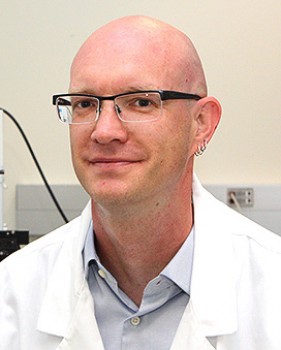Ph.D. - Psychology
Ruhr-University Bochum, Germany - 2000

Sven Kroener
Associate Professor - Department of Neuroscience
Research Interests: How is the prefrontal cortex altered in drug addiction?
Professional Preparation
M.A. - Psychology
Ruhr-University Bochum, Germany - 1996
Ruhr-University Bochum, Germany - 1996
Research Areas
Drug addiction
Mechanisms of substance abuse of alcohol and cocaine.Publications
Vagus Nerve Stimulation (VNS) Modulates Synaptic Plasticity in the Infralimbic Cortex via Trk-B Receptor Activation to Reduce Drug-Seeking in Male Rats 2024 - Journal Article
Vagus nerve stimulation (VNS) modulates synaptic plasticity in the rat infralimbic cortex via Trk-B receptor activation to reduce drug-seeking 2024 - Other
Elevations in the mitochondrial matrix protein cyclophilin D correlate with reduced parvalbumin expression in the prefrontal cortex of patients with schizophrenia 2024 - Other
Elevations in the Mitochondrial Matrix Protein Cyclophilin D Correlate With Reduced Parvalbumin Expression in the Prefrontal Cortex of Patients With Schizophrenia 2024 - Journal Article
The mitochondrial matrix protein cyclophilin D contributes to deficits in parvalbumin interneurons in schizophrenia 2023 - Other
The effects of acamprosate on prefrontal cortical function are mimicked by CaCl2 and they are influenced by the history of alcohol exposure 2022 - Journal Article
Acute Vagus Nerve Stimulation Facilitates Short Term Memory and Cognitive Flexibility in Rats 2022 - Journal Article
Deletion of the Mitochondrial Matrix Protein CyclophilinD Prevents Parvalbumin Interneuron Dysfunctionand Cognitive Deficits in a Mouse Model of NMDA Hypofunction 2020 - Journal Article
Additional Information
PERSONAL STATEMENT
My lab studies the neuronal circuitry of the prefrontal cortex (PFC) and how alterations in synaptic transmission are related to behavioral problems in drug addiction.Pathological dysfunctions that disrupt the intrinsic circuitry of the PFC and impair so-called "executive functions" and behavioral flexibility have been implicated in numerous mental illnesses, including schizophrenia and drug addiction.
Current projects in my laboratory examine how drugs of abuse (specifically cocaine and alcohol) can alter PFC function. We use an animal model of alcohol addiction to study changes in glutamatergic synaptic transmission and NMDA receptor function in the PFC. Chronic ethanol exposure induces homeostatic increases in NMDA receptors, which alters synaptic plasticity, contributing to a loss of response inhibition during the development and maintenance of addiction to alcohol.
A second line of work uses vagus nerve stimulation (VNS) as a tool to increase extinction from drug seeking and to prevent relapse.
All of our projects use a combination of behavioral, electrophysiological, and immunohistochemical techniques.
News Articles
Nerve Therapy Study Finds Potential Way to Reduce Drug Cravings
A new preclinical study led by a University of Texas at Dallas researcher shows that vagus nerve stimulation (VNS) therapy might have the potential to help people overcome drug addiction by helping them learn new behaviors to replace those associated with seeking drugs.The new research, published in the January issue of the journal Learning and Memory, found that drug cravings in addicted rats were reduced when they were treated with VNS. It’s possible that the research could be applied to people who have been addicted to drugs, said senior author Dr. Sven Kroener, assistant professor in the School of Behavioral and Brain Sciences.
Provost Award Recognizes Faculty Who Inspire Future Researchers
For Dr. Sven Kroener, assistant professor at the School of Behavioral and Brain Sciences, teaching science is more than showing a student how to use a microscope or defining a GABAergic neuron.“Science is not just data acquisition,” Kroener said. “It’s analysis and asking, ‘Did it do something to my bar graphs? Did it alter my group averages?,’ and then communicating it. If you can put together figures and then make a paper, only then is it science.”
National Funding Will Support Research on Treatment for Anxiety
 Two professors in the School of Behavioral and Brain Sciences recently received national funding to study the mechanisms behind a proposed new treatment for anxiety disorders.
Two professors in the School of Behavioral and Brain Sciences recently received national funding to study the mechanisms behind a proposed new treatment for anxiety disorders.The National Institute of Mental Health grant will provide $423,000 over the next three years to Dr. Christa McIntyre-Rodriguez and Dr. Sven Kroener to fund their research.
Diabetes Drug Shows Promise for Chronic Pain
 Scientists seeking an effective treatment for one type of chronic pain believe a ubiquitous, generic diabetes medication might solve both the discomfort and the mental deficits that go with the pain.
Scientists seeking an effective treatment for one type of chronic pain believe a ubiquitous, generic diabetes medication might solve both the discomfort and the mental deficits that go with the pain.“People who are in constant pain have problems thinking straight sometimes. The longer you’re in pain, the more entrenched the impairment becomes,” said Stephanie Shiers, a fourth-year cognition and neuroscience doctoral student at The University of Texas at Dallas and lead author of a study recently published in the Journal of Neuroscience. “These impairments aren’t addressed by existing therapeutics.”
In the study, UT Dallas researchers show how a type of chronic pain called neuropathic pain responds to metformin, one of the most prescribed medications worldwide, as well as to pain relievers gabapentin and clonidine.